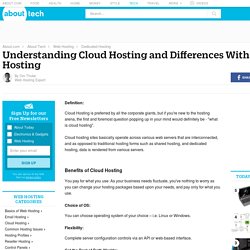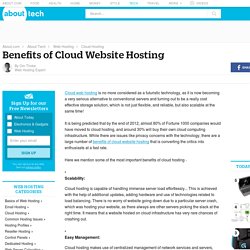

Web Hosting, Domain, Cloud, Mobile - Cryonet Web Solutions. Web Hosting Beginner Guide - Learn All Basics In One Page. What Are Top Level Domains (TLD)?

Let’s get back to our previous examples: Alexa.com, Linux.org, WebRevenue.co, eLearningEuropa.info, Yahoo.co.uk, all examples above end with a different ‘extension’ – .com, .org, .net, .biz… and so on. We call this “extension” as top level domain (shortform:TLD). Examples of other TLD include .uk, .ws, .co.jp, .com.sg, .tv, .edu, .co, .com.my, and .mobi. While most of these TLDs are open for public’s registration, there are strict regulations on certain domain registration.
For example the registration of country code top level domains (like .co.uk for United Kingdom) are restricted for the citizens of the corresponding country; and the activities with such domains website are ruled by local regulations and cyber laws. Country Code TLDs The full list of country code top-level domain (ccTLD) extensions are (in alphabet order): FAQ: What Exactly Is The Cloud?
What is Cloud Hosting? Definition: Cloud Hosting is preferred by all the corporate giants, but if you're new to the hosting arena, the first and foremost question popping up in your mind would definitely be - "what is cloud hosting".

Cloud hosting sites basically operate across various web servers that are interconnected, and as opposed to traditional hosting forms such as shared hosting, and dedicated hosting, data is rendered from various servers. Benefits of Cloud Hosting You pay for what you use: As your business needs fluctuate, you've nothing to worry as you can change your hosting packages based upon your needs, and pay only for what you use. Choice of OS: You can choose operating system of your choice – i.e. Flexibility: Complete server configuration controls via an API or web-based interface. Get the Best of Both Worlds: You can enjoy the benefits of dedicated hosting, but don't need to bear the heavy cost of dedicated hosting, if you don't have extensive requirements. Cloud computing - A simple introduction. Advertisement by Chris Woodford.

Last updated: March 23, 2015. History has a funny way of repeating itself, or so they say. But it may come as some surprise to find this old cliché applies just as much to the history of computers as to wars, revolutions, and kings and queens. For the last three decades, one trend in computing has been loud and clear: big, centralized, mainframe systems have been "out"; personalized, power-to-the-people, do-it-yourself PCs have been "in. " Photo: Cloud computing: the hardware, software, and applications you're using may be anywhere up in the "cloud. " What is cloud computing? Cloud computing means that instead of all the computer hardware and software you're using sitting on your desktop, or somewhere inside your company's network, it's provided for you as a service by another company and accessed over the Internet, usually in a completely seamless way.
Cloud computing is a buzzword that means different things to different people. It's managed Advantages. How Does Cloud Computing Work? [Technology Explained] Before we dig further into how does cloud computing work, first let’s understand what the term “cloud“ refers to.
![How Does Cloud Computing Work? [Technology Explained]](http://cdn.pearltrees.com/s/pic/th/computing-technology-explained-21575317)
The concept of the cloud has been around for a long time in many different incarnations in the business world. It mostly means a grid of computers serving as a service-oriented architecture to deliver software and data. Most websites and server-based applications run on particular computers or servers. What differentiates the cloud from the way those are set up is that the cloud utilizes the resources from the computers as a collective virtual computer, where the applications can run independently from particular computer or server configurations.
They are basically floating around in a “cloud of resources”, making the hardware less important to how the applications work. With broadband internet, the need to have the software run on your computer or on a company’s site is becoming less and less essential. How is that done? Will it change the way we use computers? A Quick Look at Benefits of Cloud Website Hosting. Cloud web hosting is no more considered as a futuristic technology, as it is now becoming a very serious alternative to conventional servers and turning out to be a really cost effective storage solution, which is not just flexible, and reliable, but also scalable at the same time!

It is being predicted that by the end of 2012, almost 80% of Fortune 1000 companies would have moved to cloud hosting, and around 30% will buy their own cloud computing infrastructure. While there are issues like privacy concerns with the technology, there are a large number of benefits of cloud website hosting that is converting the critics into enthusiasts at a fast rate. Here we mention some of the most important benefits of cloud hosting - • Scalability: Cloud hosting is capable of handling immense server load effortlessly... This is achieved with the help of additional updates, adding hardware and use of technologies related to load balancing. Understanding What Cloud Hosting Really Is!